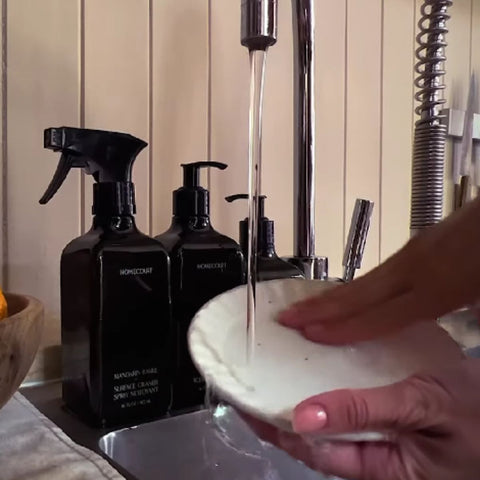Sustainable Dish Soap: A Step Towards Greener Living

In the bustling rhythm of our daily lives, it's easy to overlook the profound impact that routine choices, such as selecting a dish soap, can have on the environment. As consumers, the power to drive significant ecological change often lies in these seemingly mundane decisions. This blog post delves deep into the world of sustainable dish soaps, illuminating their pivotal role in fostering a greener lifestyle. Through a careful examination of the environmental costs associated with traditional dish soaps—ranging from the release of harmful chemicals to the persistent problem of non-biodegradable packaging—this guide aims to empower you with knowledge and choices that align with ecological responsibility.
The Environmental Cost of Traditional Dish Soaps
Harmful Chemicals
Traditional dish soaps often contain an array of harmful chemicals that can be detrimental both to your health and to the planet. These soaps are typically made up of synthetic ingredients that can be harsh on your skin, causing irritation or allergic reactions in some cases. But the danger doesn't stop at personal health; it extends to environmental health as well. Imagine washing your dishes daily, unknowingly releasing a cocktail of hazardous chemicals into your sink. These chemicals don't just disappear; they eventually make their way into rivers, lakes, and oceans. This is a troubling thought when you consider that we all share these water resources. These substances can contaminate the water, harming both plants and animals that rely on it for survival. The implications are far-reaching, affecting entire ecosystems in ways we might not fully understand.
Water Pollution
The impact of conventional dish soap on water pollution extends significantly beyond simple use and disposal. As households clean and rinse dishes, the chemical-laden water travels through plumbing systems to local wastewater treatment facilities. However, many of the synthetic compounds found in traditional dish soaps, such as phosphates and surfactants, are not fully removed during the wastewater treatment process. These chemicals can disrupt the delicate ecosystems of water bodies into which treated water is released. For instance, phosphates can accelerate algae growth, which in turn depletes oxygen in the water and harms aquatic life, leading to dead zones where no marine life can thrive. Although these facilities do their best to clean the water, they aren't always capable of removing all the residual chemicals.
Packaging Waste
A less obvious but equally important issue with traditional dish soaps is the waste generated by their packaging. Most dish soaps come in plastic bottles, usually designed for single use. While a bottle of dish soap gentle on hands may seem appealing, its plastic packaging contributes to an ongoing environmental crisis. These plastic bottles add to the ever-growing piles of waste in landfills and oceans. Plastics take hundreds of years to decompose, which means they will continue to pollute the environment long after you've finished using the soap. And let's not forget, that this packaging waste isn't just limited to bottles; even the caps and dispensers contribute to the problem. It's an ongoing environmental crisis that gets overlooked but has severe long-term consequences for our planet.
The Rise of Sustainable Dish Soaps
Eco-Friendly Ingredients
Good news is on the horizon as most natural dish soap options are gaining more and more attention for their environmental benefits. Unlike traditional dish soaps filled with harmful chemicals, these eco-friendly dish soap versions are usually made with natural, plant-based ingredients. We're talking about things like natural oils and herbs, which are both non-toxic and biodegradable.
This means that they break down naturally, leaving no lasting harm to the planet. Plus, they're just as effective at cleaning your dishes, so you don't have to sacrifice performance for sustainability. It's a win-win situation that allows you to do your part in reducing environmental damage while still keeping your dishes sparkling clean.
Biodegradable Packaging
When you're shopping for the best eco-friendly dish soap, remember to look beyond just the ingredients. The packaging is just as important. Innovations in this area include the use of biodegradable materials, such as plant-based plastics, or even alternative materials like bamboo and recycled cardboard. Recyclable packaging is another option, ensuring materials such as PET plastics can be processed and reused, reducing the demand for virgin materials and minimizing the product's overall carbon footprint.
This is another crucial step in the right direction because it ensures that the packaging won't end up clogging landfills or polluting our oceans for centuries. It's more than just about the soap inside the bottle; it's about the complete package, from what's inside to what's on the outside. Taking note of the packaging can make a big difference in your overall environmental impact.
Reduced Carbon Footprint
But the benefits of sustainable dish soaps don't stop at the ingredients or the packaging. These soaps also come with a reduced carbon footprint. This means that less carbon dioxide is released into the atmosphere during the whole life cycle of the soap—from its production to its distribution, and even its disposal. When compared to traditional dish soaps, the amount of emissions related to eco-friendly options is significantly lower. So, it's not just about what you see, like the soap and the bottle, but also about the behind-the-scenes processes that are more sustainable. In short, it's a holistic approach to being eco-friendly, taking into account multiple factors to lower the environmental impact.
Benefits of Switching to Sustainable Dish Soap
Making the switch to eco-dish soaps has several advantages for the environment and your health. It represents a simple yet significant step towards more responsible consumption and reduced ecological impact. By choosing products that are less harmful to the environment, consumers can make a positive difference with everyday actions. Here's a closer look at the benefits:
- Healthier Waterways - One of the primary benefits of using biodegradable dish soap is the positive impact on our waterways. As discussed previously, traditional dish soaps often contain phosphates and other chemicals that do not break down easily in nature, leading to water pollution and harming aquatic life. In contrast, eco-friendly dish soaps are designed to degrade naturally and quickly. By switching to sustainable dish soaps, you help to reduce the influx of harmful substances into bodies of water, thus protecting ecosystems and promoting the health of aquatic flora and fauna. This proactive choice ensures that water bodies remain cleaner and safer for future generations.
- Reduced Toxins in the Home - Conventional dish soaps are laden with a variety of chemicals, including sulfates, parabens, and fragrances, which can pose health risks to humans and pets. These substances can cause skin irritations, and allergic reactions, and may contribute to more serious health issues with prolonged exposure. plant-based dish soaps, on the other hand, are formulated from natural ingredients that are safer for both the environment and your family. By adopting these non-toxic products, you reduce the presence of harmful chemicals in your home, making it a healthier environment for children and pets. Moreover, many of these kitchen surface cleaners are versatile enough to be used on different surfaces, ensuring cleanliness without the risk of toxic residues.
- Promoting Sustainable Living - This switch, although small, can influence other decisions, promoting a broader adoption of eco-friendly products. As you begin to see the benefits of one sustainable product, you're likely to explore other areas where you can make environmentally friendly choices. Whether it’s opting for natural skin care products or reducing plastic use, each step contributes to a larger movement toward sustainability. This approach not only benefits the planet but also enriches your lifestyle, making it healthier and more ethically aligned with environmental conservation.
By making this choice, consumers can enjoy cleaner waterways, fewer toxins in their living spaces, and embrace a lifestyle that supports sustainable practices. As more individuals adopt these green products, the collective impact on our planet becomes increasingly significant, fostering a cleaner and more sustainable world for all.
How to Choose the Right Sustainable Dish Soap
Ingredient Transparency
When selecting a gentle dish soap, the clarity of ingredient listing is paramount. Transparent disclosure of ingredients by brands is not just about adherence to regulatory standards but also a signal of their commitment to consumer safety and environmental stewardship. This openness helps consumers make informed decisions based on their health concerns or environmental values. By supporting these brands, consumers encourage broader changes in manufacturing and business ethics, promoting a healthier planet. As such, checking for clear and comprehensive ingredient lists should be a key step in choosing the best dish soap for your home.
Certifications
Certifications are essential in helping consumers identify eco-friendly dish soaps that adhere to rigorous standards of quality and ethics. These third-party endorsements ensure that the products not only support sustainable practices but also respect ethical boundaries in production. The impact of these certifications extends beyond individual purchases, influencing broader industry standards and promoting a shift towards more responsible production practices. Here's a look at how each type of certification contributes to this goal:
- Cruelty-Free - For many consumers, ethical considerations are as important as the product's effectiveness. A cruelty-free label means that the product aligns with the ethical stance against animal testing, a practice viewed by many as cruel and unnecessary. This certification appeals particularly to those who are not only environmentally conscious but also concerned with animal welfare. Customers may encourage more firms to adopt cruelty-free policies by supporting companies that value humane practices by purchasing items bearing this badge.
- Organic - An organic certification signifies that the ingredients used in the dish soap were grown without the use of synthetic pesticides, herbicides, or fertilizers, which are harmful to the environment. This certification ensures that the production process supports farming methods that maintain soil health, conserve water, and reduce pollution. By opting for organically certified products, consumers contribute to a decrease in the overall demand for chemically intensive agriculture, which in turn supports the health of the planet's ecosystems and biodiversity.
- Vegan and Fair-Trade - These certifications address different aspects of product ethics. A vegan certification confirms that no animal products were used in the dish soap, catering to consumers who avoid animal derivatives for ethical or health reasons. Fair-trade certification, meanwhile, assures that the workers involved in the production of the dish soap were given fair wages and working conditions. This dual assurance demonstrates a commitment to human and animal rights, and it resonates strongly with consumers who are concerned about the ethical implications of their purchasing decisions.
By supporting products with these certifications, consumers not only ensure that their household cleaning products meet high environmental and ethical standards but also contribute to driving industry-wide changes. These certifications not only promote sustainable agricultural and manufacturing practices but also encourage fair and humane treatment of animals and workers in the production process. Ultimately, when consumers prioritize certified products, they wield their purchasing power to foster a more sustainable and ethical marketplace.
User Reviews
Reviews can detail how effective the soap is at cutting grease, its scent, and whether it leaves any residues. Importantly, users often comment on the gentleness of the soap—crucial for those with sensitive skin or allergies. Furthermore, reviews might touch on the environmental efficacy of the soap, such as how quickly it biodegrades. This feedback from actual users can validate the product's claims and help new buyers make educated decisions. By engaging with these reviews, potential buyers can assess the overall satisfaction of past consumers, ensuring that the soap meets their expectations in terms of effectiveness, environmental impact, and skin sensitivity. Therefore, spending time reading through user reviews is highly recommended to get a comprehensive understanding of the product before making a purchase.
Transitioning to sustainable dish soap is not just a minor adjustment in your daily routine, but a significant step towards a healthier and more sustainable lifestyle. By choosing eco-friendly dish soaps, you are directly contributing to the reduction of harmful chemicals and plastic waste that pollute our waterways and landscapes. This shift also supports industries that prioritize environmental responsibility, encouraging broader systemic changes in product manufacturing and packaging. Embracing plant-based, biodegradable dish soap helps preserve our ecosystems, protect aquatic life, and reduce your exposure to toxins. It's a simple yet powerful choice that echoes the value of sustainable living. Remember, each small decision you make can have a profound impact on our planet’s health. By being mindful of the products you choose, you're not only ensuring cleaner dishes but also contributing to a cleaner, greener world.


